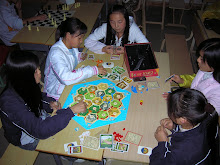Throughout the past 9 months I have slowly come to learn one important thing: Chinese language acquisition takes time. Countless frustrations change my motivation level and sometimes I avoid studying for days or weeks at a time. A period of success is quickly thwarted by miscommunication in the marketplace or grocery store. There are so many moments of failure that I often forget to relish my successful encounters.
Looking back there has been an interesting transition. When I came to China I knew some basic phrases like "Hello, Goodbye, and Where are you going?" The progression began with listening and shifted towards speaking. As my vocabulary grew, so did my interest in breaking through the next threshold: reading and writing. All of these aspects (listening/reading as input, speaking/writing as output) are interconnected and they seem to require one another in order to make real, sustainable progress. I think this is in part because of repetition of words and structures in different contexts.
At the beginning, when we were learning language for 4 hours every day in Chengdu, we focused on the basics. A dialogue might consist of the following:
"What would you like?"
"A bottle of water."
"Ok, that will be 2 dollars."
"Here is 5 dollars."
"Here is your change."
"Thank you."
These simple dialogues were crucial for unlocking the basic language used in everyday situations. Often they were connected to short vocabulary lists, such as
bottle of water
small change
how much does it cost?
store
expensive
cheap
This might be followed by a typical grammar point and then some basic sentence structures.
Today my language study is basically the same. I continue to study vocabulary lists, but my most recent one includes the following:
leader
in charge of
apologize
confused
persevere
acknowledge mistake
Special Education
grave
make offerings/sacrifices to gods/ancestors
picnic
light firecrackers
knees
kneel
freedom
pool
spider
centipede
roach
catch
force (sb to do sth)
It's odd, because these words are all written in pinyin, the Romanization of the Chinese language. I seem to always be "catching up" with the pinyin by doing a sort of back-study for words I've known awhile. Then the writing follows that. For example, I might learn the word for "person," which is "ren." Then I'll learn to read it (人)and, finally, practice and learn to write the character somewhat legibly.
As a Peace Corps Volunteer I've been spoiled with materials for learning the language. I currently have a basic grammar text, practical grammar text, common radicals text, countless audio recordings of basic dialogues, basic phrases pronunciation drills audio, Chinese character reading text, and many more.
The environment is generally very good as well. Many of the students speak Mandarin quite well, and occasionally a taxi driver surprises me with a clear, Beijing-like speech. Recently in Chengdu, once a taxi driver realized that we could communicate in Mandarin, he began giving his opinions about American politics and people. He repeated the phrase, "Americans are good, but the American government is very bad," at least 3 times throughout our conversation. I kept most of my opinions to myself, surprised that he would share his feelings so openly (this might be considered a bit rude by general Chinese cultural standards). But despite the nature of conversations, they always provide me with valuable listening and speaking practice. Even speaking with children helps me get a better grasp on language nuances.
When I get frustrated and lost everything gets cloudy. I don't understand the next few lines of speech and generally I get down on myself for awhile afterwards. Despite all of my work so far, I often still feel like I am no closer to learning the language well. But then I reflect on moments in Chengdu, last summer. My level consisted of muttering a barely understood, "check please," or a garbled, "please open the back door." I take satisfaction in comparing them to a more fluent,
"There are 3 goals of Peace Corps: 1. Help meet the development needs of the host country, 2. Help the Chinese people better understand Americans, 3. Help Americans better understand the Chinese. (Both sides have huge misconceptions, there is a mutual misunderstanding)."
4.09.2008
Subscribe to:
Post Comments (Atom)








No comments:
Post a Comment